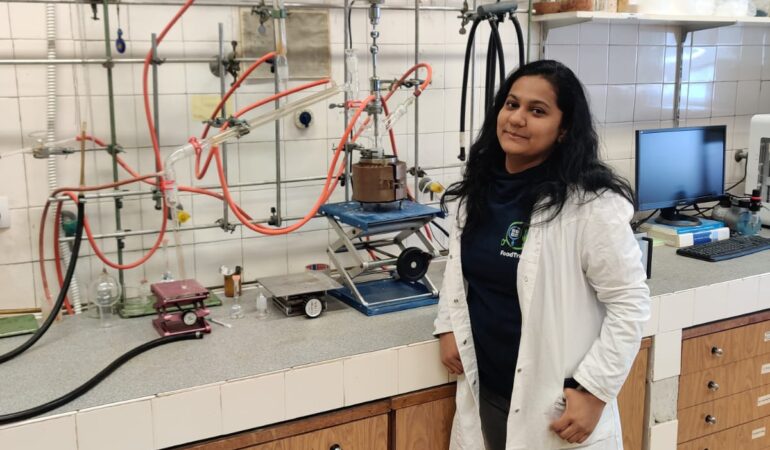
- by Katja
- 23/01/2023
As a part of the FoodTRANET-ITN project, Athira was assigned a secondment of a month (29th January to 3rd March 2023) at the laboratory of Professor Dimitrios Bikiaris, which is a part of the Laboratory of Polymer and Colors Chemistry and Technology, in the Department of Chemistry of Aristotle University of Thessaloniki, Greec. This laboratory specializes in synthesizing and characterizing novel polymers from biomass-derived monomers, synthesising biocompatible polymers, functionalizing natural polymers, incorporating nanofillers into polymeric matrices to tune their properties, and developing materials with customized properties for various removal processes etc.
Athira’s work is focused on the development of novel active packaging materials with a lower environmental impact than conventional packaging alternatives. In addition to being biodegradable, these materials must additionally possess active properties that extend shelf life, monitor food quality, and ensure food safety. She is concentrating on developing a copolymer with a PLA base to accomplish this. Although PLA is an appealing material as packaging, it has significant drawbacks, such as slower biodegradability and composting rates, higher permeability, and worse mechanical properties than plastic that is petroleum-based. Through her research, she intends to build improved PLA-based bioplastics to overcome these limitations.
The major focus of secondment was to synthesis lactic acid-based copolymer. The various stages were to design and synthesize a lactic acid-based copolymer and to study the effects of different polymerization conditions on the properties of the resulting copolymer and to characterise them. To achieve these objectives, a range of laboratory techniques were used, including polymer synthesis, purification, and analysis. Additionally, the mechanical characterisation of already extruded plain PLA films was carried out here in order to have a comparative study of copolymer films in future. The work was supervised by Prof. Bikiaris and his team, who provided expert guidance and advice throughout the duration of secondment.
Lactic acid was copolymerized with an aliphatic ester in the presence of a suitable catalyst and under optimised conditions to obtain a lactic acid-based copolymer. First, attempts are made to synthesize various aliphatic polyesters such as polyalkylene oxalates, polyalkylene succinates and polyalkylene adipates by polycondensation reaction. The resulting polymers were then tested for their properties such as intrinsic viscosity and thermal properties. The polyester, polyethylene adipate that had optimal intrinsic viscosity and thermal stability, which met the conditions for good processability, was chosen for copolymerization with the lactic acid monomer. Synthesis of polyethylene adipate-co-lactic acid (PEA-co-LA) was conducted with various ratios of polyethylene adipate to poly lactic acid under optimal conditions. The further physico-chemical characterisations and processing (extrusion, injection moulding etc) of the copolymer will be carried out at our laboratory (Laboratory for Characterization and Processing of Polymers).
